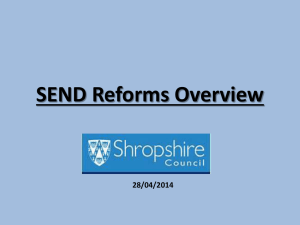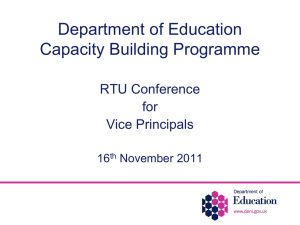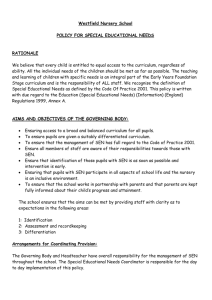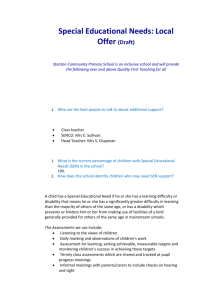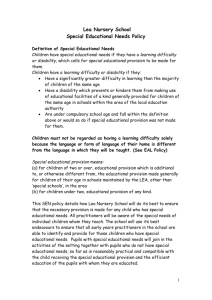SEN Policy - Maidenhead Nursery School
advertisement
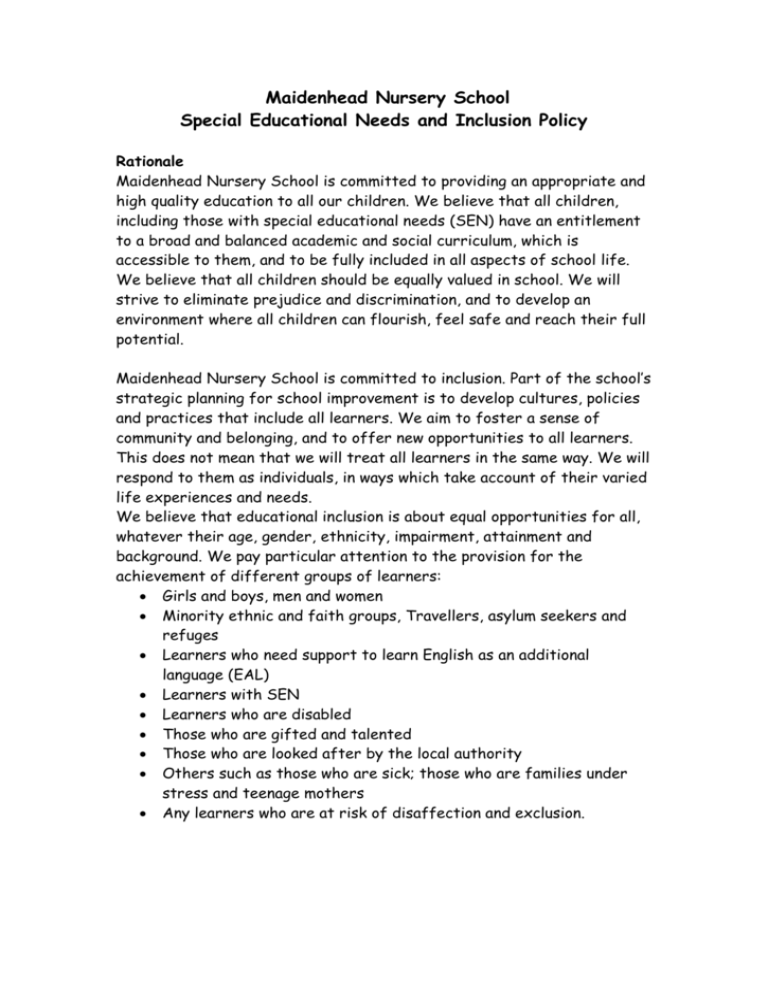
Maidenhead Nursery School Special Educational Needs and Inclusion Policy Rationale Maidenhead Nursery School is committed to providing an appropriate and high quality education to all our children. We believe that all children, including those with special educational needs (SEN) have an entitlement to a broad and balanced academic and social curriculum, which is accessible to them, and to be fully included in all aspects of school life. We believe that all children should be equally valued in school. We will strive to eliminate prejudice and discrimination, and to develop an environment where all children can flourish, feel safe and reach their full potential. Maidenhead Nursery School is committed to inclusion. Part of the school’s strategic planning for school improvement is to develop cultures, policies and practices that include all learners. We aim to foster a sense of community and belonging, and to offer new opportunities to all learners. This does not mean that we will treat all learners in the same way. We will respond to them as individuals, in ways which take account of their varied life experiences and needs. We believe that educational inclusion is about equal opportunities for all, whatever their age, gender, ethnicity, impairment, attainment and background. We pay particular attention to the provision for the achievement of different groups of learners: Girls and boys, men and women Minority ethnic and faith groups, Travellers, asylum seekers and refuges Learners who need support to learn English as an additional language (EAL) Learners with SEN Learners who are disabled Those who are gifted and talented Those who are looked after by the local authority Others such as those who are sick; those who are families under stress and teenage mothers Any learners who are at risk of disaffection and exclusion. Definition of Special Educational Needs Children have SEN if they have a learning difficulty or disability, which calls for special educational provision to be made for them. Children have a learning difficulty or disability if they: Have a significantly greater difficulty in learning than the majority of children of the same age Have a disability which prevents or hinders them from making use of educational facilities of a kind generally provided for children of the same age in schools within the area of the local education authority Are under compulsory school age and fall within the definition above or would so do if special educational provision was not made for them. Children must not be regarded as having a learning difficulty solely because the language or form of language of their home is different from the language in which they will be taught. Special educational provision means: (a) for children of two or over, educational provision which is additional to, or otherwise different from, the educational provision made generally for children of their age in schools maintained by the LEA, other than ‘special schools’, in the area (b) for children under two, educational provision of any kind. This SEN policy details how Maidenhead Nursery School will do its best to ensure that the necessary provision is made for any child who has SEN. All practitioners will be aware of the special needs of individual children whom they teach. The school will use its best endeavours to ensure that all early years practitioners in the school are able to identify and provide for those children who have special educational needs. Children with SEN will join in the activities of the setting together with children who do not have special educational needs, so far as is reasonably practical and compatible with the child receiving the special educational provision and the efficient education of the children with whom they are educated. The setting will have regard to the Special Educational Needs Code of Practice (2001) when carrying out its duties toward all children with SEN. Parents will be notified of a decision by the school that SEN provision is being made for their child. Partnership with parents Partnership with parents plays a key role in enabling children and young people with SEN to achieve their potential. Maidenhead Nursery recognises that parents hold key information and have knowledge and experience to contribute to the shared view of a child’s needs and the best ways of supporting them. All parents of children with SEN will be treated as partners and supported to play an active and valued role in their children’s education. Views of the child Children and young people with special educational needs often have a unique knowledge of their own needs and their views about what sort of help they would like to enable them to make the most of their education will be ascertained. They will be encouraged to participate in all the decision-making processes and contribute to the assessment of their needs, the review and transition processes. The views of the child will be determined through focused observations of their engagement in tasks, the choices that they make in regard to participation in activities and through discussions with parents. Identification, Assessment and Provision in Early Education Settings The Early Learning Goals sets out what most children will have achieved by the end of the Foundation Stage. The Early Years Foundation Stage (September 2008) also sets out what children within age bands should be achieving. We recognise that children will progress at different rates during the Foundation Stage and some children will not be achieving the expected norms. Such children will need differentiated learning opportunities to help them progress and regular monitoring of their progress. Graduated response Monitoring of individual children’s progress throughout the Foundation Stage is essential. Where a child appears not to be making progress then it may be necessary to use alternative approaches to learning. Ongoing difficulties may indicate the need for help above that which is normally available for children in the setting. The key test for action is evidence that the child’s current rate of progress is inadequate. Adequate progress Adequate progress can be defined in a number of ways. It might, for instance, be progress that: closes the attainment gap between the child and the child’s peers prevents the attainment gap growing wider is similar to that of peers starting from the same attainment baseline, but less than that of the majority of peers matches or betters the child’s previous rate of progress ensures access to the full curriculum demonstrates an improvement in self-help, social or personal skills Demonstrates improvements in the pupil’s behaviour. Once practitioners have identified that a child has special educational needs, the setting will intervene through Early Years Action (School Action). If this intervention does not enable the child to make satisfactory progress the SENCO (Special Educational Needs Coordinator) may need to seek advice and support from external agencies. This form of intervention is referred to as Early Years Action Plus (School Action Plus). Informing parents to contribute their knowledge and understanding of their child and raise any concerns they may have about their child’s needs and the provision that is being made for them, is an essential initial step. Responsibilities for SEN within Maidenhead Nursery The governing body must report to parents annually on the schools provision for SEN. A named governor is responsible for SEN. The Head teacher, Helen McHale, has responsibility for the day to day management of all aspects of the nursery’s work, including provision for children with SEN. The school’s designated person, known as the Special educational Needs Co-ordinator (SENCO) is Helen McHale. She works closely with colleagues having responsibility for the operation of the school’s SEN policy and co-ordinating provision for children with SEN. All practitioners in the nursery are involved in the identification, assessment and provision for children with SEN and in the development of SEN policy. The practitioner usually responsible for the child is responsible for working with the child with SEN on a daily basis and for planning and delivering an individualised programme. The SENCO In Maidenhead Nursery School the SENCo is Helen McHale. The SENCO will have responsibility for: ensuring liaison with parents and other professionals in respect of children with special educational needs advising and supporting other practitioners in the setting ensuring that appropriate Individual Education Plans are in place ensuring that relevant background information about individual children with special educational needs is collected, recorded and updated deployment of staff to support children with SEN. The SENCO will take the lead in further assessment of the child’s particular strengths and weaknesses; in planning future support for the child in discussion with colleagues; and in monitoring and subsequently reviewing the action taken. The SENCO will also ensure that appropriate records are kept including a record of children at Early Years Action and Early Years Action Plus and those with statements. The teacher/practitioner usually responsible for the child will remain responsible for working with the child on a daily basis and for planning and delivering an individualised programme. There will be regular of children’s progress discussions in team meetings and the SENCO will have regular discussions with key workers to develop teaching and learning strategies for individual children. Early Years Action When a child is identified as having a special educational need, interventions should be devised that are addition to those provided as part of the setting’s usual curriculum (Early Years Action). The triggers for intervention through Early Years Action could be concern about a child who despite receiving appropriate early education experiences: makes little or no progress even when teaching approaches are particularly targeted to improve the child’s identified area of weakness continues working at levels significantly below those expected for children of a similar age in certain areas presents persistent emotional and/or behavioural difficulties, which are not ameliorated by the behaviour management techniques usually employed in the setting has sensory or physical problems, and continues to make little or no progress despite the provision of personal aids and equipment has communication and/or interaction difficulties, and requires specific individual interventions in order to access learning. If practitioners in consultation with parents conclude that a child may need further support to help them progress, staff should seek the help of the SENCO. The SENCO and colleagues will collect all known information about the child and seek additional information from the parents. In some cases, outside professionals from health, social services or the education psychology service may already be involved with the child. If external professionals have not already been working with practitioners, the SENCO should contact them if parents agree. Nature of intervention The SENCO and the child’s teacher/key worker, in consultation with parents, will decide on the Action needed to help the child to progress in the light of their earlier assessment. This Action will comprise of individualised arrangements for learning and teaching. These arrangements may include: Extra adult time in devising the nature of the planned intervention and monitoring its effectiveness The provision of different learning materials or special equipment Some individual or group support or staff development and training to introduce more effective strategies Access to LA support services for one-off or occasional advice on strategies or equipment Staff training to provide effective intervention without the need for regular or ongoing input from external agencies. Individual Education Plans Strategies employed to enable the child to progress will be recorded within an Individual Education Plan (IEP). This should include information about the short-term targets set for the child the teaching strategies the provision to be put in place when the plan is to be reviewed the outcome of the action taken. The IEP will record only that which is additional to, or different from, the differentiated curriculum in place as part of normal provision. The IEP will focus on up to four key targets and will be discussed with parents and the child. The IEPs will be continually kept ‘under review,’ but are formally reviewed two to three times a year. Parents will be consulted as part of the review process. Early Years Action Plus Early Years Action Plus is characterised by the involvement of external support services that can provide more specialist assessments, give advice on the use of new or specialist strategies or materials, and in some cases provide support for particular activities. The triggers for referral for seeking help from outside agencies could be that, despite receiving an individualised programme and/or concentrated support, the child: continues to make little or no progress in specific areas continues working at an early years curriculum substantially below that expected of children of a similar age has emotional or behavioural difficulties which substantially and regularly interfere with the child’s own learning or that of the group, despite having an individualised behaviour management programme has sensory or physical needs, and requires additional equipment or regular visits for direct intervention or advice by practitioners from a specialist service has ongoing communication or interaction difficulties that impede the development of social relationships and cause substantial barriers to learning. When the school seeks the help of external support services, those services will need to see the pupil’s records in order to establish which strategies have already been employed and which targets have been set and achieved. The external specialist may act in an advisory capacity, provide additional specialist assessment or be involved in teaching the pupil directly. The resulting IEP for the pupil will set out new strategies for supporting the pupil’s progress. Delivery of the IEP will remain the responsibility of Early Years practitioner. Requests for statutory assessment For a very few children the help given by the early education setting through Early Years Action Plus will not be sufficiently effective to enable the child to progress satisfactorily. It will then be necessary for the setting, in consultation with the parents and any external agencies already involved, considering whether a statutory multi-disciplinary assessment may be appropriate. Where a request for a statutory assessment is made to the LA (Local Authority), the pupil will have demonstrated significant cause for concern and the setting will provide evidence to the LA detailing: The school’s action through Early Years School Action and Early Years School Action Plus Individual education plans for the pupil Records of regular reviews and their outcomes The pupil’s health including the pupil’s medical history where relevant Educational and other assessments, for example from an advisory specialist support teacher or an educational psychologist Views of the parents and of the pupil Involvement of other professionals Any involvement by the social services or education welfare service. When the LA receives a request for a statutory assessment, it will decide within six weeks whether to carry out such an assessment. Statutory assessment involves consideration by the LA, working co-operatively with parents, the child’s educational setting and, as appropriate, other agencies, as to whether a statutory assessment of the child’s special educational needs is necessary. Where the evidence presented to the LA suggests that the child’s learning difficulties may call for special educational provision which cannot reasonably be provided within the resources normally available to the setting, the LA will consider the case for a statutory assessment of the child’s special educational needs. The LA may decide that the degree of the child’s learning difficulty and the nature of the provision necessary to meet the child’s special educational needs is such as to require the LA to determine the child’s special educational provision through a statement of special education need. This will detail: The pupil’s name, address and date of birth Details of all of the pupil’s special needs Identify the special educational provision necessary to meet the pupil’s special educational needs Identify the type and name of the school where the provision is to be made Include relevant non-educational needs of the child Include information on non-educational provision All children with statements of special educational needs will have shortterm targets set for them that have been established after consultation with parents, child and include targets identified in the statement of educational need. These targets will be set out in an IEP and be implemented, at least in part and as far as possible, in the normal early years setting. The delivery of the interventions recorded in the IEP will continue to be the responsibility of the early years practitioner. Annual review All early years statements will be reviewed at six monthly intervals with all involved invited to consider whether any amendments need to be made to the description of the pupil’s needs or to the special educational provision specified in the statement. The review will focus on what the child has achieved as well as on difficulties that need to be resolved. The SENCO of the receiving primary school will be invited to attend the final review in the early years setting, to allow them to plan an appropriate IEP to start at the beginning of the new school year and enable the pupil and the parents to be reassured that an effective and supportive transfer will occur.



